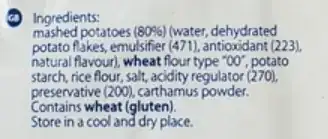Should I salt the water when boiling dry gnocchi? I have seen some recipes where they do salt the water, but also advice on some websites recommending not to do so.
Most information on the internet seems to be about fresh gnocchi, so I’m not sure if the advice would be different for dry gnocchi.
These are the ingredients of the gnocchi:
Edit
So far people are suggesting to salt the water. So, I would like to share a source which recommends not doing so:
A culinary article in the Milwaukee Journal Sentinel says the following:
"Typically you cook pasta in salted water," said Wisniewski. "But in the case with gnocchi, the salt will cause the potato starch to become sticky, and you'll end up with a mushy product."
It seems they are talking about fresh gnocchi here, but a counterargument to that for the case of dried gnocchi would be helpful.
